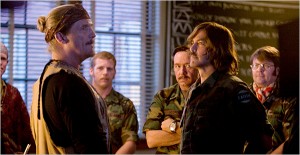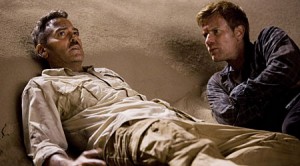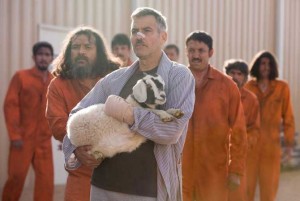The Men Who Stare At Goats
 No matter what you think of Saw as a film, it’s hard to deny that the guys who made it, James Wan and Leigh Whannell, are geniuses. Not that they’re all that talented, as a feature film Saw is derivative, badly acted, and needlessly convoluted. What differentiates Wan and Whannell from standard exploitation filmmakers (torture porn is such a misleading term, Saw and Hostel are simply the new versions of Grindhouse films) is that they were able to get financing for a movie that is 90% padding. The concept, two men awaken in a room, unaware how they got there, and with a dead body in front of them, is terrific, it’s that there’s nothing else to the movie except for distractions. Saw goes off on so many tangents, mostly consisting of exposition and backstory that you pretty much forget about the central story, which was the only novel thing about the film in the first place. There’s virtually no present tense in Saw and therefore no tension. The main characters become supporting players in their own movie
No matter what you think of Saw as a film, it’s hard to deny that the guys who made it, James Wan and Leigh Whannell, are geniuses. Not that they’re all that talented, as a feature film Saw is derivative, badly acted, and needlessly convoluted. What differentiates Wan and Whannell from standard exploitation filmmakers (torture porn is such a misleading term, Saw and Hostel are simply the new versions of Grindhouse films) is that they were able to get financing for a movie that is 90% padding. The concept, two men awaken in a room, unaware how they got there, and with a dead body in front of them, is terrific, it’s that there’s nothing else to the movie except for distractions. Saw goes off on so many tangents, mostly consisting of exposition and backstory that you pretty much forget about the central story, which was the only novel thing about the film in the first place. There’s virtually no present tense in Saw and therefore no tension. The main characters become supporting players in their own movie
Grant Heslov’s The Men Who Stare at Goats suffers from the exact problem as Saw, the entire story is told by a journalist writing about it, but he could have been edited out of the story without harming it at all. Perhaps the idea was to get an everyman into the movie, so all of the other characters could play wacky as juxtaposition. After all, the movie is based on a very funny book by Jon Ronson (who also wrote the even more incisive and funny Them: Adventures With Extremists), who rarely tries to insert himself into the narrative for attention because he knows the stories he’s witnessing are plenty. Ronson is portrayed by Ewan McGregor, but given the awfully whitebread character name Bob Wilton. In real life, Ronson is British. McGregor in real life is Scottish. Close enough where American audiences wouldn’t necessarily be able to distinguish it. So then why is McGregor playing an American? And who let him sport that awful accent?
 The accent is hardly the only thing wrong with the conception of McGregor; the movie goes into a lot of detail about the theoretical psychic powers of a small faction within the military, and the most powerful are referred to as Jedi Warriors. Now Heslov could have cast anyone in the world as Wilton except McGregor, because the Jedi joke is such a distraction (McGregor played Obi-Wan Kenobi in the last three Star Wars films). The choice reveals a lot about Heslov’s approach to the material, the film’s sense of humor is constantly aware of its own goofiness, with George Clooney, Kevin Spacey, and Jeff Bridges frequently given silly looking wigs to differentiate time periods.
The accent is hardly the only thing wrong with the conception of McGregor; the movie goes into a lot of detail about the theoretical psychic powers of a small faction within the military, and the most powerful are referred to as Jedi Warriors. Now Heslov could have cast anyone in the world as Wilton except McGregor, because the Jedi joke is such a distraction (McGregor played Obi-Wan Kenobi in the last three Star Wars films). The choice reveals a lot about Heslov’s approach to the material, the film’s sense of humor is constantly aware of its own goofiness, with George Clooney, Kevin Spacey, and Jeff Bridges frequently given silly looking wigs to differentiate time periods.
Heslov thinks he’s making a Coen Brothers movie, so Clooney and especially Bridges (both veterans of Coen films) continuously play up how “off” they are when the source material renders all of that behavior unnecessary. The fact that the military really did train some of their troops to stare at goats until they stopped their hearts is funny in and of itself. We don’t need kidnap subplots with Clooney and McGregor, slapstick fights, drug hi-jinks that are right out of a mid 80s teen camp movie, and psychic rivalries between Spacey, Bridges, and Clooney to tide us along, though that might have been Heslov’s way of tying the story together, since the book is mostly a string of anecdotes.
 The thing is, adapting just the tone of absurdity of the book would have worked just fine, you don’t need to tell us why a man (the unfortunately wasted Stephen Root) trying to kill his hamster using only his mind is funny. So you root for The Men Who Stare At Goats, and there are a handful of funny moments, but mostly it tries too hard.
The thing is, adapting just the tone of absurdity of the book would have worked just fine, you don’t need to tell us why a man (the unfortunately wasted Stephen Root) trying to kill his hamster using only his mind is funny. So you root for The Men Who Stare At Goats, and there are a handful of funny moments, but mostly it tries too hard.
As with Saw, simplification would have been best. Maybe if Heslov had it to do over, he would set his movie in a dingy room with two men trying to blow up a dead man using their minds. Perhaps he should just direct Saw VII?



